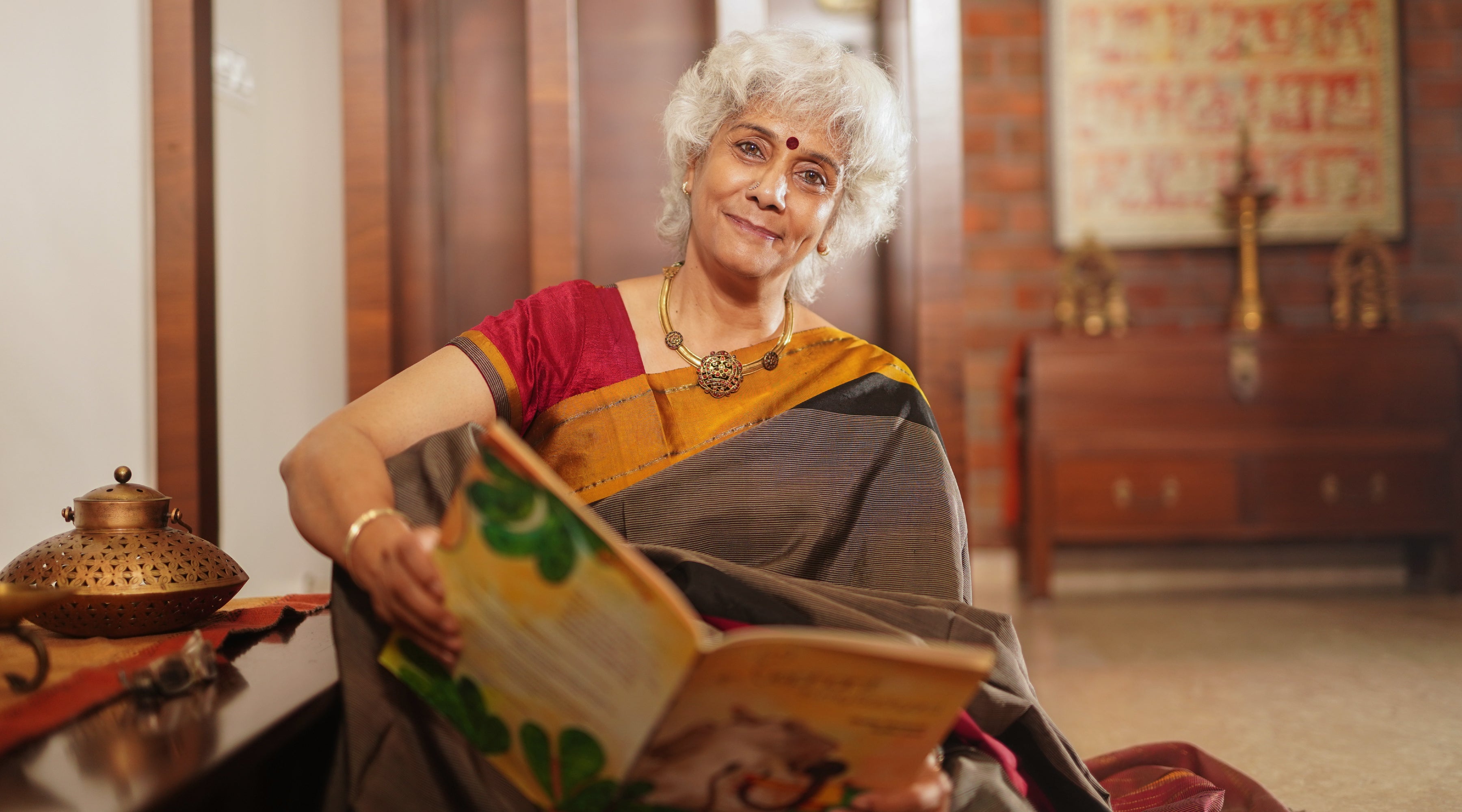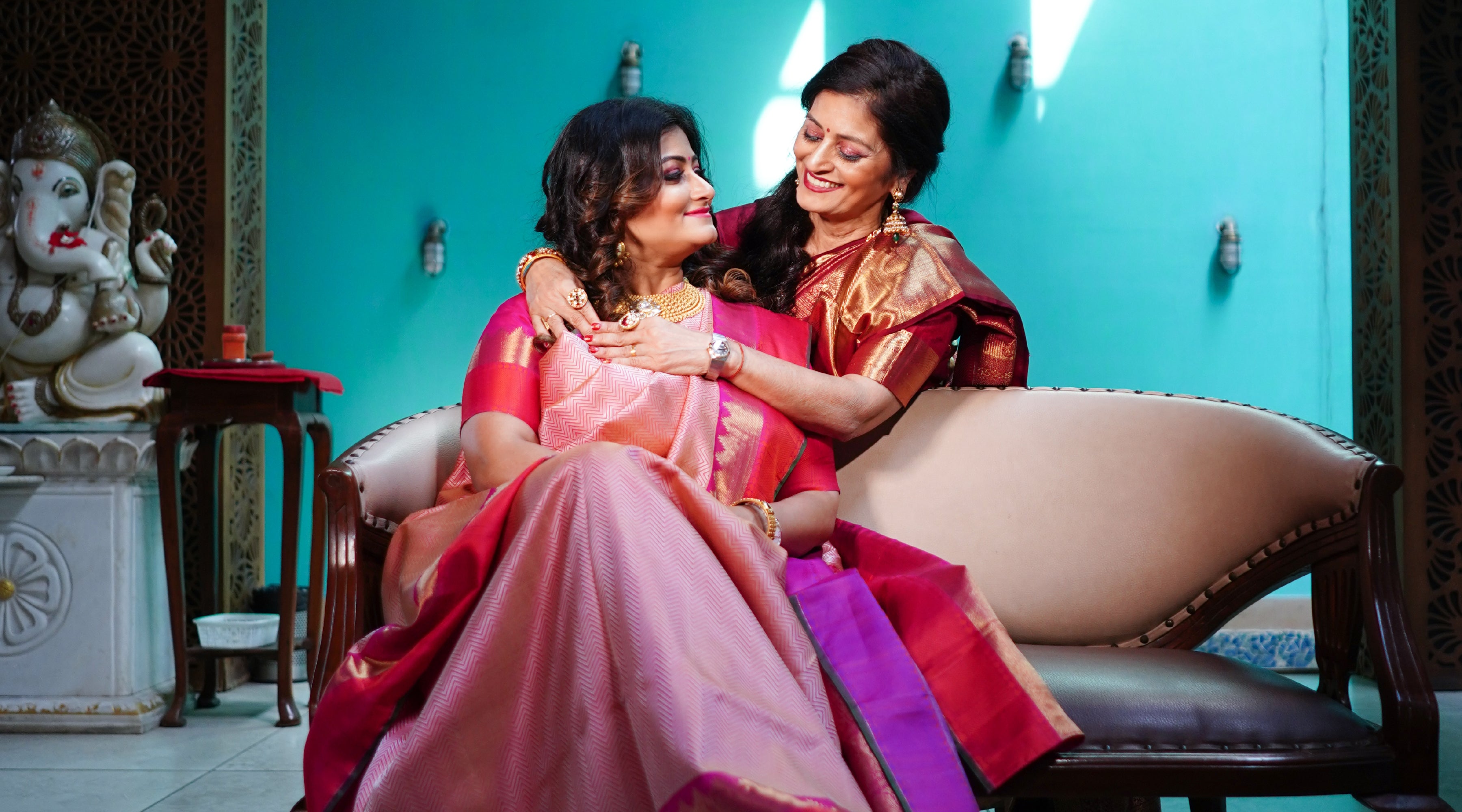KANAKAVALLI VIGNETTES : Dr. Lakshmi Subburaj - A Journey in Medicine

Dr. Lakshmi Subburaj, Kanakavalli’s April Vignette, is a gynaecologist who runs her own hospital in Madurai. In conversation with Aneesha Bangera for The Kanakavalli Blog, Dr. Lakshmi reminisces about growing up with two sisters and parents who raised her to be fiercely independent. Reflecting on her journey, she opens up about working with women from varied backgrounds across the country, and about her hopes for the future of women’s health in India. Passionate about her field of work, Dr. Lakshmi also supports an organisation that aims to create awareness on women’s health. When she isn’t busy delivering babies, Dr. Lakshmi loves to travel, spend time with her children, and dress up in her favourite saris. For her, beauty is a reflection of ourselves. Taking the time to browse through the Kanakavalli repertoire, Dr. Lakshmi curates a selection of saris that speak to her abiding love for the drape. Excerpts of the conversation below…
A Journey in Medicine
Raised with confidence
Being a woman is constantly challenging, whether as a young girl overcoming obstacles to go to school, or balancing one’s career, family and social expectations. However, I believe that it is challenging because of those around us, and not because of any lack in our ability to manage the multiple roles we play. Being a woman also brings great happiness—to fight for one’s rights to achieve one’s dreams against the odds is a wonderful thing.

Above (Clockwise from top left): Dr. Lakshmi as a child; The three girls with their father who encouraged them to be independent; A family photograph of Dr. Lakshmi with her sisters, parents, husband and brother-in-law.
Growing up, we were three sisters, and I was in the middle. My younger sister was quiet, but my older sister and I were like Tom and Jerry. We fought constantly, but were also extremely close. My mother was the backbone of the family, running the household while helping out with the family business. My father was an amazing role model. He never once made us feel as though he wished he’d had sons, and instead raised his three daughters to be fiercely independent and confident. He treated us as equals, engaging us in conversation and ensuring we were aware of current affairs, business and politics. He would work all day, and then stay up late into the night talking to us about work and the world. All three of us have vivid memories of these conversations and of the invaluable advice he shared with us over midnight snacks.

Above (left to right): An old photograph of Dr. Lakshmi's father, her role model; With her father, whose invaluable advice she still remembers.
The family business was in the field of logistics, and my father ensured that both my mother and my sister learnt to run the company. He never stopped us from achieving our potential, and encouraged us to be tough in the face of adversity.
A journey in medicine
Both my parents were inspired by the gynaecologist who delivered me, and wanted me to become a doctor. My two sisters followed my father’s footsteps into the business of logistics, but I became the family’s first doctor. I work as a gynaecologist and my husband is a laparoscopic surgeon, and we run our own hospital in Madurai.
When my father fell ill with COVID-19 last year, I was able to be with him every step of the way. For me, this experience showed me why being a doctor was my destiny. The fact that I am a practicing doctor with my own hospital meant I could be with my father when nobody else was allowed to, right up to the end, when we lost him.
I’m proud of the work I do and I am so happy I chose this path.
Over the years, I have worked across India, as a doctor in training and as a practicing gynaecologist. I have worked with women in Rajasthan, Uttar Pradesh, and Gujarat. I have worked in big cities like Delhi as well as in rural areas in South India. I have always been struck by the wonderful women I have treated from different backgrounds.

Above (clockwise from top left): At a Women's Day awareness walkathon in Madurai; Dr. Lakshmi receiving the WONDER FOGSIAN award for her contribution to the field of obstetrics and gynaecology; Conducting a free women's health camp at her hospital.
Unfortunately, in some parts of India, women are still afraid to speak up, and are completely dependent on their husbands. I have treated women who cannot answer questions about how many children they have or how old they are, without turning to their husbands for help. Due to a lack of awareness about women’s health issues, some women bear six or seven children, and this takes a huge toll on their minds and bodies.
On the other hand, there are parts of India where public health programmes have resulted in greater awareness of women’s health. Young girls are growing increasingly knowledgeable about their own bodies, thanks to better education and exposure. Schools play a key role in this and it is heartening to see these positive changes.
Delivering babies brings so much joy and positivity to the world. I had a patient some time ago who had been trying to conceive for a long time. After eight months of treatment, she finally got pregnant and she was so happy. After giving birth to a healthy baby, she still comes to see me, and tells me that she will never forget me.
At the same time, being a doctor comes with its own challenges. It is easy to feel helpless in the face of a system that discriminates against women, but it is important to find ways to reach out and make a difference. I have been associated with an NGO that creates awareness about women’s health issues, educating young girls and women about their bodies as well as ideas of ‘good’ and ‘bad’ touch. I believe that little changes can go a long way in creating a more equal society.
Looking ahead
There are several government and other programmes that have the power to improve women’s health in India if they are implemented effectively.
Two areas of focus that I believe will make a big difference are better awareness of haemoglobin levels for women and the HPV vaccine that can prevent cervical cancer. Both can help women take their health into their own hands. I truly believe that when women are healthy, their families and communities are healthier and happier too.

Beyond work
I love my mornings, and I take my time to dress up in my favourite saris for work. While I love all kinds of saris—cottons, chanderis, kalamkaris—I often choose kanjivarams. Since delivering babies is a cause for celebration, it is quite acceptable to wear rich silks to work!
I also enjoy travelling and I want to visit all the 106 Divya Desam temples. I have already travelled to about 15 of these, thanks in part to my work which has taken me to Mathura, Ayodhya and Nepal.

Above (clockwise from top left): Dr. Lakshmi at one of the Divya Desam temples near Trichy; On a visit to Nepal; With her mother and her friends at the Sri Ranganathaswamy temple in Srirangam.
I have recently started journaling and this is something I really enjoy. I also love creating bright and beautiful spaces in my home that are warm and welcoming. My garden is a source of delight, with a serene Buddha overlooking the greenery. I think life should be colourful and this is reflected in corners of my home, where I display vibrant decor objects that add joy and warmth. When I’m not working or travelling, I spend time with my children, having long conversations, exchanging ideas and exploring the things that interest them.

Above (left to right): On a family trip to China; Dr. Lakshmi with her husband - who she calls her better half - in Kanyakumari.
On beauty, tradition and the sari

Beauty is a reflection of ourselves—our values, our ideas, our mindsets. It comes in all shapes and sizes.
For me, tradition is that which will never be outdated. With tradition, beauty only rises.
My love for the sari started when I was young and I watched my mother wear beautiful drapes. As a medical student, I had to wear saris to college every day and I began raiding my mother’s cupboards. At first, I borrowed simple cotton handlooms, and then I graduated to heavier and more elaborate saris. My sisters and I still fight over our mother’s collection of saris. We are constantly peeking into each other’s cupboards to find borrowed saris, often exchanging or passing them around.

Above (clockwise from top left): Dr. Lakshmi with her niece; Her daughter dressed in her first sari, bought from Kanakavalli; Dr. Lakshmi posing with her daughter who is a classical dancer.
The kanjivaram is the most beautiful sari—making a woman look and feel like a queen. I love the drape and fall of Kanakavalli’s kanjivarams. We recently had a half-sari function for my daughter, and we picked a gorgeous chilli red Kanakavalli kanjivaram with a vibrant parrot green pallu for her. She is quite young but carried off the sari effortlessly because she was so comfortable in it.
On the Vignettes kanjivaram
I first saw this kanjivaram online, and as soon as I laid my eyes on it I knew I had to have it. I usually like to see a sari in person before buying it, but I was so worried that this one would get sold before I made it to the store, so I bought it online. Black is my favourite colour, and I love this unusual palette set against grey and red. This is one of my absolute favourites from Kanakavalli.

Dr. Lakshmi is wearing a classic Kanakavalli kanjivaram in grey shot with black and embellished with checks enclosing peacocks, paisleys and circular buttis in crimson red. Crimson floral motifs and geometric patterns adorn the borders and pallu.
- Dr. Lakshmi Subburaj, in conversation with Aneesha Bangera, photography by Raghuram Vedant.
View Dr. Lakshmi's accompanying guest curation here.



